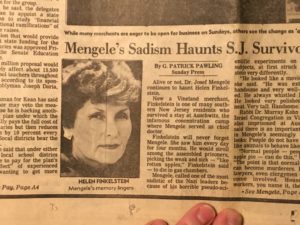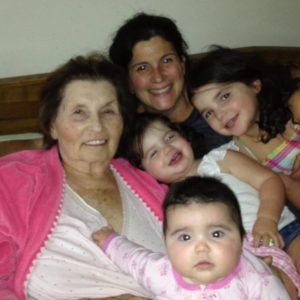“When the train stopped I was pushed onto the platform where I stood in the chaos, waiting for my mommy to get off the train, and holding onto my two little brothers as if my life depended on it. As those two little boys were wrenched from my arms I looked up to see my mom throw some of our belongings from the train, among them, my favorite blue dress. I was 14, my brothers were 5 and 7, and that moment was the last I saw of any of them. As I attempted to grab the blue dress, I was shoved into a line of screaming women with no idea of what lie ahead and all I could see of my past was laying in a pile on those tracks…”
These words are just a small part of my grandmother’s story; a part I know so well because that is when she started to cry, every time, until the day she died. Her story is one that I’ve been listening to for as long as I can remember and before I was old enough to ask. It’s a story that’s become so intricately woven into the tapestry of who I am, that I sometimes forget it’s not even my own.
My Family’s Story
Her name was Helen Finkelstein, but from the moment I could talk, I affectionately named her Pouka. She was as beautiful as she was brave and a woman well ahead of her time in many ways. When many survivors were still silent about their past, she found catharsis in speech and insisted that everyone know “what those animals did to [her]”. Among the silent was my grandfather, Joseph Finkelstein (Pop-Pop, to me). With the exception of a few typed pages in which he briefly recorded his story, we knew little of his torment. The day Pouka recorded her Shoah video, Pop-Pop could do little but sit in the background. In the late stages Parkinson’s disease he could barely speak, but when asked if he had anything to add, he gently murmured, “There’s just so much to tell…”
Those words have always haunted me, and along with my grandmother’s story, left me with an extraordinary sense of responsibility to keep their memories and the Jewish faith alive. I’ve participated in the March of the Living on Yom Hashoah when thousands of Jewish teens walk from Auschwitz to Birkenau, down those very train tracks where Pouka’s blue dress once lay, and through the ominous iron gates marked with the words, “Arbeit Macht Frie” or “Work Will Make You Free.”
Over the years I continued to study, teach and speak about the Holocaust. But slowly, and without realizing it, diaper duty took precedence over my duty to Holocaust education and I took for granted that I still had Pouka around. I don’t regret it though; in her last few years I was able to give her the pleasure of embracing her great-grandchildren and a family that she once never dared to imagine could be.
Then this past October, on the AISH/JWRP MOMentum trip to Israel, I visited Yad Vashem, Israel’s Holocaust Memorial Museum, and was reminded of that spark that used to shine so bright inside me and admonished myself for letting it die. But as I walked through the powerful Children’s memorial, surrounded in the darkness by thousands of flames reflected from one lone candle, I thought about my own little girls—these three little people who would never have been here if things had worked out differently for their great grandparents (on both sides). At that moment, I realized that the spark hadn’t gone out at all, I’d just been busy creating three new lights and getting ready to pass their story onto them when they grow ready to hear it.
In my family’s small town of Vineland, New Jersey lived a huge number Holocaust survivors, including people whose stories were featured in movies like Escape from Sobibor and my grandfather’s best friend who served American Presidents and chaired the committee responsible for the Holocaust Memorial Museum in Washington, DC. They all settled there with common, tormented pasts and dreams for a better future. They found new families within each other and eventually established a memorial at the Jewish cemetery to make sure those who lost their lives weren’t forgotten. Today, most of these survivors, including Pouka and Pop-Pop, are now buried in this very cemetery. With every trip to Vineland I go to that cemetery to visit my grandparents, say kaddish at that memorial and walk the rows upon rows of grave stones, all denoting the words “Holocaust Survivor,” a bleak reminder of how much we’ve already lost.
Keeping our Shared Memories Alive
And this is why I’m taking action today. With every passing survivor we lose the opportunity to hear extraordinary first-hand accounts of survival. It’s now up to us, the families that they’ve created, to keep their legacies alive.

Upon the death of infamous Nazi doctor, Joseph Mengele in 1985, a South Jersey newspaper article featured Helen and other Vineland survivors, talking about their personal encounters with him and reactions to his death.
By the time I’d made the short walk from the doors of Yad Vashem to our tour bus, I had already written an email to the JCRC (Jewish Community Relations Counsel) about getting back involved with their Holocaust educational programming. Two weeks later, I met JCRC staff and two other 3G’s (3rd generation Holocaust survivors) creating a new group for descendants of Holocaust survivors: Generations After MN.
Our first goal is to simply seek out as many local descendants of Holocaust survivors as we can. To that end, we’ve started a Facebook group where we hope that anyone who reads this, whether it is the child, grandchild, or great grandchild of a Holocaust survivor, will join and tell others. Then, please join us on Sunday, February 21 from 12-2pm at Beth El Synagoge for a chance to meet other people who share similar backgrounds and hear more about how to get involved and what we’re all about—and have lunch on us! It’s our hope to shine a light on the Holocaust through our group’s involvement in current and future programming and give our group’s members the opportunity to use their family’s personal story to ultimately teach tolerance so we can legitimately say, “Never again.”


